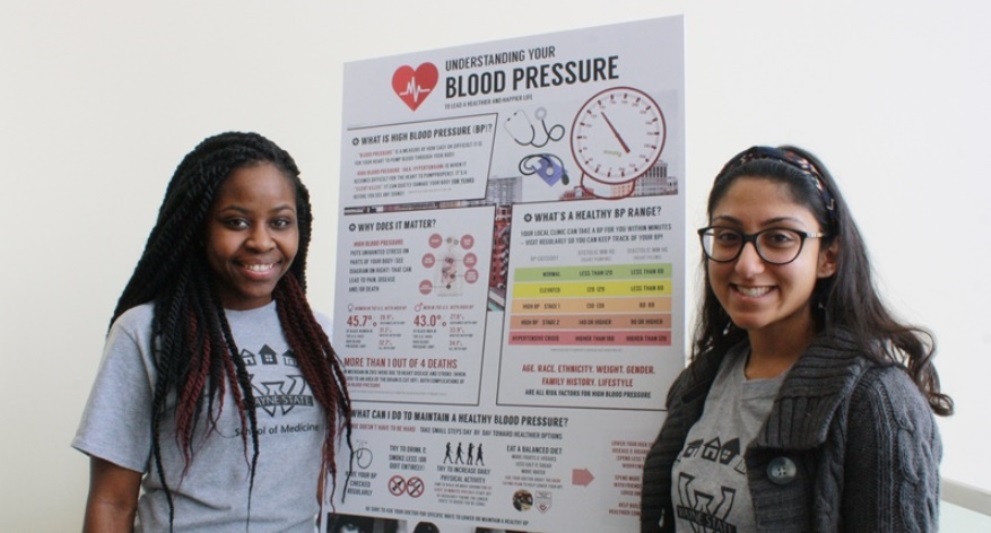
Macda Gerard, left, and Anita Ukani are two members of the gray learning community for the Class of 2021. Their team volunteered at Cass Clinic in Detroit, and presented this poster on blood pressure at March 8's M.D. Student Community Impact Day.
The Class of 2021 presented more than four dozen assigned group projects at the Wayne State University School of Medicine's inaugural M.D. Student Community Impact Day held from 10 a.m. to 1 p.m. March 8 in Mazurek Medical Education Classrooms 240 to 308.
"This project helped us have a greater perspective on why we're here in the first place, and why we learn what we're learning. It gave us a better picture of the community we are going to serve," said first-year Macda Gerard, whose team designed a colorful poster explaining what high blood pressure is, why it matters and what can be done to treat it.
All medical schools in the United States are required by the Association of American Medical Colleges to incorporate service learning into their curriculum in some way, but the School of Medicine takes the requirement several steps further, seeing it as an opportunity to make a real difference in the community through required clinical site volunteering while also bolstering longitudinal mentorship among the four classes, including pairing first-year learning communities with second-year students.
Gerard's group was also assigned to volunteer at the Cass Clinic in Detroit.
"This was a good way to see what the patients' barriers were. Doing the project helped us get a better understanding of helping patients understand their condition," added teammate Anita Ukani.
School of Medicine Dean Jack D. Sobel, M.D., visited the project stations earlier in the day, and congratulated the freshmen for their outstanding efforts at the recognition ceremony in the Green Lecture Hall.
"What I saw was remarkable, and our students are remarkable," he said. "We have the best students. Our students function as a community. It was a total joy."
The projects were the work of the school's eight color-coded learning communities - blue, brown, gray, green, orange, purple, red and yellow. The learning community concept was introduced for the Class of 2021. Each community includes 36 students assigned to one color. Those students are then assigned to a four- to six-member cohort within that color. The latter makes up the students' community impact project team.
On Thursday, dozens of WSU faculty, staff and affiliated community partners visited the teams to learn more about how the school and its students are responding to our diverse community's health needs, positively impacting eight of the top 10 chronic illnesses and diseases affecting Detroit residents. They include chronic lower respiratory diseases, cardiovascular diseases, hypertension, obesity, HIV/AIDS, pneumonia, diabetes mellitus and chronic kidney disease.
"I really liked the project, and the clinic that we went to," said Alahna Smith, whose team was assigned to a clinic for children with autism. Their chronic disease category was diabetes, a category they weren't sure how to tackle in relation to the mental disorder. Then they met children with severe food aversions, including some who would only eat Doritos, fast food hash browns and other food and drink that could contribute to early onset diabetes. The team presented "Food chaining as a treatment plan for children with autism with food aversions."
"It really opened my eyes to what parents are going through. As future physicians, we could see the family side of autism," Smith said.
Students designed the projects to increase patient understanding of lifestyle choices and the management of chronic diseases that impact their health and the health of their children, using a variety of approachable mediums, from traditional brochures and posters to YouTube videos, a children's book, online Buzzfeed.com articles and even a song.
"It is great to understand what information is out there," said Eric Miller, founder of The Lawn Academy, a nonprofit organization for which the School of Medicine's Aesculapians Honor Society regularly volunteers. The Lawn Academy teaches young men ages 11 to 19 how to serve their community while providing them a platform for leadership and success.
First-year medical student Ally Flessel, a learning community representative announced each learning community's most outstanding projects, selected by fourth-year students who will provide feedback on what would, and would not, work in real-life clinical settings.
"It helped educate first-year students about how to present information in a way that is understandable to patients," said Andrew Darmahkasih, a fourth-year student who helped choose the winner from the gray community, which was assigned the chronic disease hypertension.
"Patient education is very important. I could see a lot of these being implemented at my future clinic," he added.
The winners were:
Buzz Feed C.O.P.D. - Blue Learning Community
Story Book - the Heart that Skipped a Beat - Brown Learning Community
Blood Pressure Calendar - Gray Learning Community
Beverage Radiology - Green Learning Community
Brochure Facts about HIV - Orange Learning Community
Card on Oral Medications for Type 2 Diabetes - Red Learning Community
Comic Book Pneumonia Awareness - Purple Learning Community
Calendar Kidney Disease S.M.A.R.T Goals - Yellow Learning Community